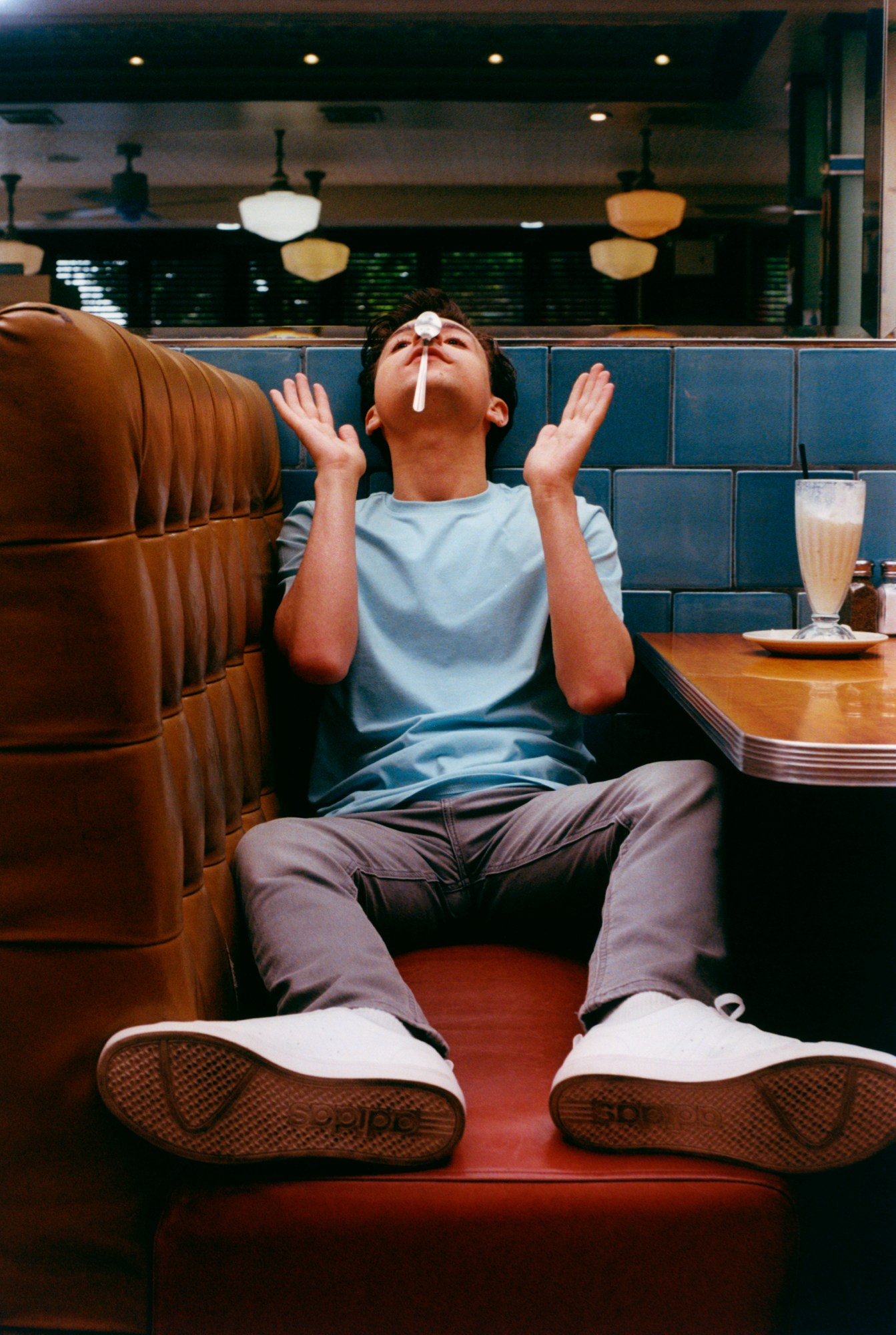Jake Ryan looks nervous. “I’ve been trying to deal with that by breathing: inhale… exhale…” the 19-year-old actor says, gesturing his hands up and down in a calming motion. We’re in a hotel room in Cannes that overlooks the Mediterranean Sea. Down on the Croisette, tourists, journalists and the odd movie star are milling about. In just a few hours, Jake’s new film – one of the most anticipated of the Cannes Film Festival – will have its world premiere: Asteroid City, Wes Anderson’s space age meditation on grief and isolation. He’ll walk up the iconic red carpet in the company of his iconic co-stars. It’s the first time he’s ever been to a film festival.
There’s a canniness and beyond-his-years wisdom that Jake’s character in the film – a junior stargazer named Woodrow – possesses, not only because he’s a genius teen scientist touching down in the titular desert town to unveil his latest invention. In an early scene, Woodrow’s father Augie (Jason Schwartzman) tells Woodrow and his younger sisters that their mother has passed away; all Woodrow can muster in response is that he thinks he “sensed it already”, carrying a weight of loss with him before he was fully aware of why that was. In an immensely stacked cast of Wes Anderson regulars (Tilda Swinton, Edward Norton) and newbies (Maya Hawke, Scarlett Johansson), Jake’s character is the film’s earnest, intelligent heart. “He’s a smart guy,” Jake says. “Smarter than I’ll ever be. But that also makes him very lonely.”
There are glimmers of Woodrow throughout Anderson’s work. He’s the latest in the filmmaker’s troupe of precocious leading boys — think Sam Shakusky in his 60s tween runaway film Moonrise Kingdom or Zero in The Grand Budapest Hotel. They’re big dreamers, resourceful and driven to succeed no matter how lofty their aspirations are.
While the partnerships between Wes and his closest collaborators — like Owen Wilson, Jason and Tilda — are venerated, Jake is one of the director’s more low-key compatriots. At the age of seven, he played Suzy Bishop’s grumpy sibling in Moonrise Kingdom. Not long after, Wes enlisted him for an adorable Sony advert in which mobile phones are operated by tiny robots inside of them (“I have a writing credit [on that] but really, as an eight-year-old, that was just me rambling”). Then, there’s a short film with Jason Schwartzman, a Siskel/Ebert-type debate with his brother on the DVD extras for Fantastic Mr. Fox and an appearance on the commentary for the Moonrise Kingdom’s Criterion Collection release. During the recording of the latter, Wes asked him for a small favour. “[He] took me in the back and said, ‘Hey, can you record some lines for me? I’m working on a new stop motion animation,’” he recalls. “And that was my part in Isle of Dogs.”

Despite orbiting Wes’ worlds for so long, Jake secured his role in Asteroid City through a standard audition, albeit with the slight advantage of knowing just about everyone on the director’s team. Jake turned 18 on set, an occasion that was celebrated by an impromptu concert on spoons. (Wes, on his part, gifted him the most Wes Anderson-y present imaginable: a satchel emblazoned with “Feliz Compleaños”.) In that sense, Asteroid City was a poetically apt passing-of-the-torch moment for Jake and his on-screen father. He turned the same age as Jason when he first joined the Wes Anderson clan as another of his overachieving students: Max Fischer in 1998’s Rushmore.
The town of Asteroid City, built from the ground up in the small Spanish town of Chinchón, felt like a communal summer camp for Jake and his fellow junior stargazers. To build camaraderie between the troupe, they set up a chess tournament — and despite none of them having any experience with the game, it stretched on and on until they resigned to a tie between Jake and Grace Edwards, who plays fellow intrepid scientist Dinah. “My chess strategy was, like, I don’t know what I’m doing so neither can my opponent,” Jake says, grinning. “And I won almost every single time.” Uno was another game that ignited their competitive sides. “I feel bad for Sophia [Lillis], because she was always so close to winning, but she just couldn’t squeeze it out.”
Understanding what it’s like to be a young genius was a heavy task laden with homework. Jason suggested he read the works of Ray Kurzweil. “He was a known futurist,” Jake says, “and he recommended that I try to get into the mindset of a futurist, somebody who could see how life would be in like 50 years.” Anderson also set an assignment to imagine another invention his character would devise. “I finally landed on something that would help other scientists or other storytellers articulate their ideas,” Jake says. “I called it the Thought Processor. Basically, you take a sedative and put this little helmet bowl on your head, and it would be connected to this etch-a-sketch-like pad via wires. Any shape that you could think of, it would show up on the pad.” He might downplay his intellect in person, but he’s got Woodrow-esque ideas running through him.
Jake had the quintessential child actor experience, which he calls “the grind” of bouncing between homeschool in Long Island and auditions in Manhattan. Like a little Max Fischer, he had an omnivorous taste for hobbies encouraged by his parents, who let him try just about everything. When those were narrowed down to two – gymnastics (“I could do a balancing beam without falling over”) or performing – Jake opted to act.

In the way that we might cringe at our childhood photographs, Jake’s past roles operate as a kind of embarrassing but high-production home video collection. The actor became a viral darling in Bo Burnham’s Eighth Grade, as its scene stealer: Kayla’s chicken nugget-eating friend with an affinity for underwater handstands. However, at the mention of Gabe, he almost grimaces. “I was only there shooting for five days,” he says, but his nascent teenage self, still not quite comfortable in his skin, is immortalised forever. Making films as a child, it seems, can feel like a funhouse mirror that reflects a warped image of yourself. “It’s a puberty thing,” he adds. “After I turned 10 or 11, I started becoming more self aware. That became even more apparent after I saw myself in Eighth Grade. I was like, ‘Holy shit, I talk like this?’”
“Gabe was also one of the roles that is closer to my own personality.” He’s not wrong. During our conversation, just like Gabe, he gesticulates: leaning forward in his seat and arms resting over his thighs as he swivels from side to side. Sometimes, his mind will search for the right word to say, and when he finds it, he does a finger gun motion to signal ‘Gotcha’. Yet for someone who shot to prominence through capturing the jittery realism of Gen Z preteens, his distinct mode of performance is so attuned to the precise rhythms of Wes’ style.
Jake Ryan feels grateful here in Cannes, anticipating the culmination of a decade-long mentorship coming to fruition. For him, Asteroid City represents a homecoming. “It’s a reconnecting with everybody that I knew ever since I was a kid,” he says. “This is going to be 12 years of knowing these people. Just getting that chance to prove what I was able to do, it was very important to me.”

‘Asteroid City’ is in cinemas now.
Credits
Photography Ashley Markle
Location Remedy Diner, New York City

